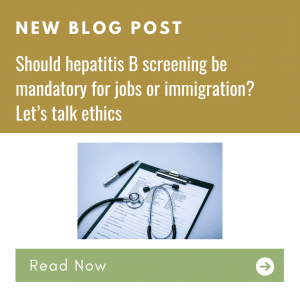
Hepatitis B (HBV) is a virus that affects the liver and can lead to serious health problems like liver cancer. Because it can spread through blood and other body fluids, some governments and employers have considered making HBV screening mandatory, especially for people applying for jobs or immigration. But is that fair? Let’s break down the ethical issues.
Hepatitis B screening is a simple blood test that checks if someone has the virus. The U.S. Centers for Disease Control and Prevention (CDC) now recommends that all adults get screened at least once, even if they don’t have symptoms (Schillie et al., 2023). That’s because many people don’t know they have it, and early treatment can prevent serious illness.
The problem with making it mandatory
While screening can help protect public health, forcing people to get tested—especially for employment- or immigration– related reasons can harm communities and increase stigma and discrimination.
- It can take away personal choice.
Mandatory screening means people don’t get to decide for themselves if they want to be tested. Often people are not even informed of the testing taking place or why it is occurring. That goes against the idea of informed consent, which is a basic principle of medical ethics. People should be able to choose whether to get tested, especially when it involves sensitive health information.
- It can lead to discrimination.
HBV is more common in certain parts of the world, such as Asia and Africa. So, if screening is required for immigrants, it could unfairly target people from those regions. That can lead to stigma and even racism. In fact, studies show that people in Asian and Black communities in the U.S. are more likely to die from HBV-related illnesses than White communities (Schillie et al., 2023). Many communities in parts of Africa and East Asia are unfairly targeted through these mandatory screening tests which limit economic opportunities and lead to social isolation and stigma.
- What happens after the test?
Another issue is what happens if someone tests positive. Will they be denied a job or visa? Will they get access to treatment or linkage to care? If screening is mandatory, there should also be support systems in place—such as affordable health care and protection from discrimination. Otherwise, it’s not just unfair—it’s harmful.
- Privacy matters.
Health information is personal. If employers or immigration officers have access to someone’s HBV status, that could well be a privacy violation. People might lose jobs or face rejection just because of a medical condition that’s manageable with treatment.
A better way forward
Instead of making HBV screening mandatory, experts suggest offering it as part of routine health care. That way, people can get tested without feeling singled out. Universal screening also helps reduce stigma because it treats everyone equally. Additionally, people who test positive or need the hepatitis B vaccine should have easy access to medical care and vaccination options.
In short, HBV screening is important, but it should be done in a way that respects people’s rights and reduces stigma and discrimination.
References:
Schillie, S., Wester, C., & Vellozzi, C. (2023). Universal adult hepatitis B screening: Updated recommendations from the CDC. Morbidity and Mortality Weekly Report, 72(6), 145–150. https://doi.org/10.15585/mmwr.mm7206a1

